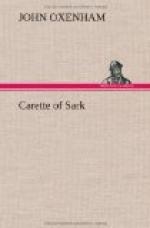We laid him in the bottom of the boat and covered him with the mizzen sail.
“Keep well out round Bec du Nez,” said Uncle George, “and run so for half an hour. Then run due east for two hours, and then make for Jersey. God keep you, my boy! It’s a bitter duty, but you’re doing the right thing.”
He wrung my hand, and pushed off and disappeared in the darkness, and we ran up the lug and went thrashing out into Great Russel.
We turned and ran before the west wind straight for the French coast, till the sun rose and the cliffs of Sercq, about twelve miles away, gleamed as though they had but just been made—or had newly risen out of the sea. Then we turned to the south-west and made for Jersey.
As soon as it was light I saw Krok’s eyes dwelling on our passenger with a very natural curiosity. Torode was unknown to him as to most of us, but there was a whole world of enquiry in his face as he sat looking down on the unconscious face below—studying it, pondering it, catching, I thought, at times half glimpses of the past in it.
I saw that I must tell him a part of the truth, at all events, for I should need much help from him. My mind had been running ahead of the boat, and trying the ways in front, and it seemed to me that Jersey was no safe refuge for a forfeited life.
Torode of Herm was a name known in all those coasts. The news of his treacheries and uprooting was bound to get there before long. Some long-headed busybody might stumble on our secret and undo us. My mind had been seeking a more solitary place, and, ranging to and fro, had lighted on the Ecrehou rocks, which I had visited once with my grandfather and Krok and had never forgotten.
“Do you know who this is, Krok?” I asked, and he raised his puzzled face and fixed his deep-set eyes on mine.
He shook his head, and sat, with his chin in his hands and his elbows on his knees, gazing down into the face below, and I sat watching him what time I could spare from my steering.
And at last he knelt down suddenly and did exactly as Uncle George had done—lifted the black moustache from off the unconscious man’s mouth, and threw back his own head to study the result. Then I saw a wave of hot blood rush into his face and neck, and when it went it left his face gray. He looked at me with eyes full of wonder and pain, and then nodded his big head heavily.
“Who, then?” and he looked round in dumb impatience for something to write with, and quivered with excitement. But the ballast was bars of iron rescued from the sea, and there was nothing that would serve.
Then of a sudden he whipped out his knife, and with the point of it jerkily traced on the thwart where I sat, the word “FATHER,” and pointed his knife at me.
“Yes,” I nodded. “It is my father come back, when we all thought him dead. He comes in disgrace, and his life would be forfeited if they found him, so you and I are going to hide him for a time—till he is himself, and can go away again.”




